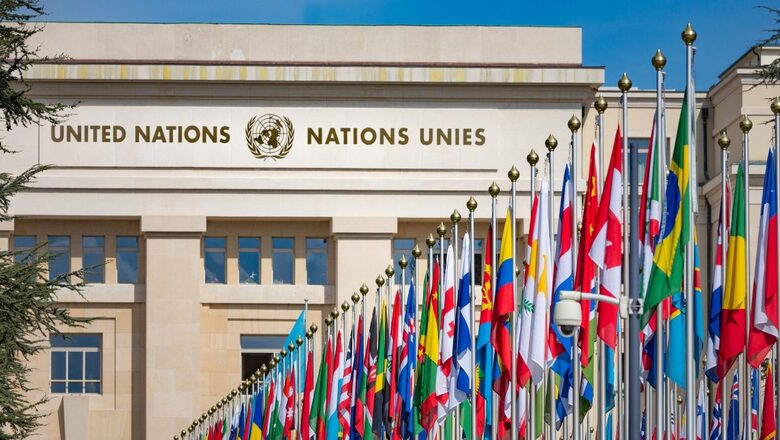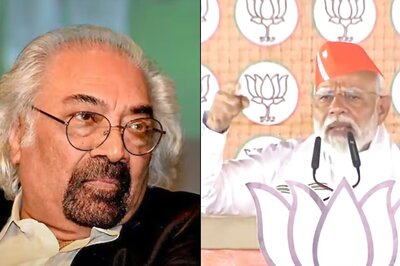
views
October 24, 2023, was United Nations Day. Every year, the day commemorates the foundation of the United Nations in 1945. In 1947, the United Nations General Assembly (UNGA) designated the United Nations Day to mark the anniversary of the United Nations Charter, dedicating it to inform the global community about the goals and accomplishments of the UN and soliciting their support for its mission. Further, resolution 2782 of 1971 by the UNGA proclaimed the United Nations Day as the international observance day, recommending its observance as a public holiday by the UN member state.
The Theme
As the United Nations completes 78 years of its being, the theme of the 2023 United Nations Day emphasises on commemorating the 75th anniversary of the Universal Declaration of Human Rights (UDHR), under the overarching theme of “Equality, Freedom, and Justice for All.”
To Bring us to Heaven, or to Save us from Hell
Before I create the ‘balance scorecard’ of the 78 years of the United Nations, I am reminded of Dag Hjalmar Agne Carl Hammarskjöld, the famous Swedish economist and diplomat who was the second Secretary-General United Nations from April 1953 to September 1961. For his role as the Secretary-General, he was awarded the Nobel Peace Prize. To put his role in perspective, he is the only Nobel Peace Prize laureate to have been awarded the distinction posthumously.
Dag Hammarskjöld played a humongous role in the strengthening of the fledgling new global institution, both internally and externally, in his tenure as UN Secretary-General before his second term was cut short by his unfortunate demise when he succumbed in a plane crash while en route to the ceasefire negotiations during the Congo Crisis. On May 13, 1954, Dag famously concluded his convocation address to the students at the University of California Berkley, with his now classic paragraph- “It has been said that the United Nations was not created in order to bring us to heaven, but in order to save us from hell. I think that sums up as well as anything I have heard both about the essential role of the United Nations and the attitude of mind, we should bring to its support.”
I humbly posit that unfortunately with planet Earth still smarting in the aftermath of Covid-19, the worst pandemic of the last one hundred years and the massive destruction unleashed due to the two wars (Russia-Ukraine and Israel-Hamas) and other ongoing strife in Africa and elsewhere, the recent events prove conclusively that neither the goal of bringing us to heaven nor saving us from hell is within the grasp of United Nations anytime soon. Contrarily, the cash-strapped institution is fighting for its own survival.
The Balance Scorecard
This piece traces the antecedents of the setting up of the United Nations, traverses the long journey of its sporadic successes and monumental failures in living up to its Charter and creates a big picture of why the time is ripe to reform, reimagine and reboot the United Nations to retain its relevance in an increasingly fractured world.
League of Nations that Proved the Road to Nowhere
The history of setting up international organisations to cooperate on specific issues traces back to 1865, when the International Telecommunication Union was founded, followed by the establishment of the International Telegraph Union, and the Universal Postal Union in 1874. In 1899, the International Peace Conference was held in The Hague to elaborate instruments for settling crises peacefully, preventing wars and codifying rules of warfare. It adopted the Convention for the Pacific Settlement of International Disputes and established the Permanent Court of Arbitration, which began working in 1902.
The League of Nations (1919-1946) is often called the predecessor of the United Nations and was established in 1919 after World War I, under the Treaty of Versailles. It was the first intergovernmental organisation established with the core purpose “to promote international cooperation and to achieve international peace and security”. Its founding document – the Covenant of the League of Nations – was drafted during the peace negotiations at the end of the First World War. It was composed of 26 articles and covered many aspects of the organisation such as the conditions for membership, the functions of the principal organs, the mechanisms for a peaceful settlement of international disputes, and the obligations of the Member States. The Covenant also contained the main principles on which the League was built.
The League of Nations had a laboured birth, insalubrious existence and premature death. It collapsed altogether with the commencement of World War II.
St James Palace Declaration
The genesis of the setting up of the United Nations can be traced back to 1941, in the Declaration of St. James Palace when on June 12, 1941, Great Britain, Canada, Australia, New Zealand and the Union of South Africa and exiled governments of Belgium, Czechoslovakia, Greece, Luxembourg, the Netherlands, Norway, Poland, Yugoslavia and of General de Gaulle of France, met at the ancient St. James Palace and signed a declaration which stated, in part: “That the only true basis of enduring peace is the willing co-operation of free peoples in a world in which, relieved of the menace of aggression, all may enjoy economic and social security; and that it is their intention to work together, and with other free peoples, both in war and peace to this end.”
The Genesis
But in the true sense, the origin of the Charter of the UN can be traced back to the Atlantic Charter, signed on August 14, 1941, by Franklin D. Roosevelt, President of the United States of America, and Winston Churchill, Prime Minister of the United Kingdom, that included “certain common principles in the national policies of their respective countries on which they base their hopes for a better future for the world”. The Atlantic Charter in its eighth paragraph referred to the future “establishment of a wider and permanent system of general security”.
Becoming
The word ‘United Nations’ coined by US President Franklin D. Roosevelt was first used on January 1, 1942, in the Declaration of the UN when 26 States at war with the Axis Powers, including the United States, the United Kingdom, China and the Union of Soviet Socialist Republics (USSR), subscribed to the common program of purposes and principles embodied in the Atlantic Charter in a document, which became known as the ‘Declaration by United Nations’.
India was part of the original 26-member 1942 ‘Declaration by the United Nations’. The becoming of the United Nations was given shape in the next three years during the Moscow and Teheran Conferences (1943), Dumbarton Oaks and Yalta (1944) and finally the San Francisco Conference (1945).
The Birth
Four years after the beginning of the talks to have the United Nations, it was officially born on October 24, 1945. As it happened with the Second World War in the closing stages, with many countries ravaged and ruined and a world desperately glamouring for peace, from 25 April to 26 June 1945, San Francisco was host to the congregation of 50 countries to deliberate and setting up of United Nations. For the next two months, the participating nations drafted and then signed the UN Charter, thereby creating the United Nations, which, it was hoped, would prevent another world war like the one they had just lived through.
The United Nations came into existence on October 24, 1945, after its Charter had been ratified by China, France, the Soviet Union, the United Kingdom, the United States and by a majority of other signatories.
78 years have gone by. True to its mandate, the United Nations has succeeded in preventing World War III, but unfortunately, it has failed comprehensively to ensure peace and security in the world, uphold international law, and climate action to limit global warming and protect human rights. Over decades, it has also become a flawed institution.
Suffice to say at this stage that the United Nations is in crying need of its history to be rewritten if it is to remain relevant in the fast-changing and fractured world facing multifarious problems.
The Prize
From a two-country Atlantic Charter in 1941 to 26 countries at the Declaration by United Nations in 1942 to 50 founding nations of the UN in 1945, and fast forward to 193 member states in October 2023, the UN has numerically been a success. Indubitably, it is the most representative global institution today.
It is worth mentioning in this regard that in its 78 years of existence, in recognition of the excellent work done, the United Nations, its specialised agencies, funds, programmes and staff have been awarded the coveted Nobel Peace Prize 12 times. This includes two Secretary Generals, Dag Hammarskjöld and Kofi Annan. After being awarded the prize jointly with the world body, Secretary-General Kofi Annan in 2001 told UN staff that he hoped winning the prize “will encourage all of us to tackle our tasks with even greater determination.” Not to be undone, one UN agency, the United Nations High Commissioner for Refugees (UNHCR) has been awarded the Nobel Peace Prize twice in 1954 and 1981.
The Success
It is clear that since its becoming, the United Nations has played a stellar role and has some unquestionable success stories, few of which are as under.
- Peacekeeping: One of the biggest success stories of the UN has been the UN peacekeeping missions that operate in the most dangerous and difficult environments in the world, dealing with conflicts – or their aftermath – which others cannot, do not want or will not address.
Since 1948, the UN has helped end conflicts and foster reconciliation by conducting successful peacekeeping operations in dozens of countries including Cambodia, El Salvador, Guatemala, Mozambique, Namibia and Tajikistan. UN peacekeeping has also made a difference in other places with recently completed or ongoing operations such as Sierra Leone, Burundi, Côte d’Ivoire, Timor-Leste, Liberia, Haiti and Kosovo.
UN peace operations by means of providing basic security guarantees and responding to crises, have supported political transitions and helped buttress fragile new state institutions. They have helped countries to close the chapter of conflict and open a path to normal development, even if major peacebuilding challenges remain. However, the track record has not been totally unblemished as the world has witnessed its failure in Somalia, Rwanda and the former Yugoslavia.
- Material Assistance: The UN has proved to be the lifeline to millions across the world. It has been a success story worthy of praise, which includes, but is not limited to food and cash assistance to over 100 million people and shelter to nearly 100 million displaced people who fled their homes due to persecution, conflict, or human rights violations. Also, UN agencies play a definitive role in supplying vaccines to vulnerable children, saving an estimated 2 to 3 million lives each year from preventable diseases.
- Human Rights: This is another UN success story. The first comprehensive international legal framework for Human Rights was established by the United Nations and culminated in the Universal Declaration of Human Rights and the subsequent International Covenant on Economic, Social, and Cultural Rights and the International Covenant on Civil and Political Rights.
The UN High Commissioner for Human Rights coordinates the oversight bodies which are responsible for enforcing treaties after they are ratified. Although it is difficult to assess whether recommendations and oversight result in legislative changes or real changes on the ground, the UN’s efforts at the very least create an international standard for nations to strive towards.
Nonetheless, human rights violations across the world, even in developed countries, are the order of the day and despite making all the the right noises on these critical issues, the UN has proved a cropper in implementation, leaving much to be desired.
- Sustainable Development Goals: It began with the Earth Summit in 1992 in Rio de Janeiro, Brazil where more than 178 countries adopted Agenda 21, a comprehensive plan of action to build a global partnership for sustainable development to improve human lives and protect the environment. It has finally culminated in the 2030 Agenda for Sustainable Development, adopted by all UN Member States in 2015, that provides a shared blueprint for peace and prosperity for people and the planet, now and into the future. At the heart of the Agenda are the 17 SDGs, which are an urgent call for action by all countries, developed and developing, in a global partnership. They recognise that ending poverty and other deprivations must go hand-in-hand with strategies that improve health and education, reduce inequality, and spur economic growth, all while tackling climate change and working to preserve our oceans and forests.
Again, the issue of actual achievement of measurable SDG targets in a fixed timeframe is something on which the United Nations has no handle to use.
- Decolonisation: In the early days of being established, the UN played a great role in the decolonisation process in the world. When it was founded in 1945, nearly a billion humans lived in territories controlled by colonial powers. That number has come down to almost nought today with a key feature of the human rights framework of the United Nations being every nation’s right to sovereignty and self-determination. The General Assembly in its early years passed multiple resolutions on decolonisation, including its landmark Declaration on the Granting of Independence to Colonial Countries and Peoples and four International Decade for the Eradication of Colonialism resolutions.
The history of the UN is still being written. And it is time to look at its failures to decide why it is time now to reform, reimagine and reboot the United Nations.
Failures
No doubt with the UN being there, World War III, whose prevention was one of its objectives has been kept in abeyance but sadly, since its inception, war has always been raging in one or another region of the world. Make no mistake, often the five of its veto power nations have either been perpetrators or active supporters of one or the other side to the war. The inability to bring peace to planet Earth has been the biggest failure of the United Nations along with its inability to arrest the fast-growing human rights abuses in war and peacetime alike.
The failure of the UN has been legion and in recent times, the most momentous failure has been in the two ongoing wars of Russia-Ukraine and Israel-Hamas. While the UN’s role in Russia’s invasion of Ukraine has been anaemic, in the Israel-Hamas war, for merely telling the truth to the UN Secretary-General, Israel has asked him to resign forthwith. On the humanitarian front, its biggest recent failure has been the response to the pandemic of the century including playing to the tune of China leading to millions of innocent deaths.
The inability of the UN to stop human rights abuse and wars, new or old, one time or in perpetuity has been the most significant failure of the UN. After 78 years and nearly a trillion dollars spent on the UN, its repeated failures include a lack of enforcement mechanism, complete domination by five permanent members of the Security Council that make purposive action against the perpetrator impossible and often the failure of its peacekeeping forces.
The two most talked about failures of the UN are its reputation tarnished by numerous allegations of peacekeepers charged with protecting civilians sexually abused women and children, including in the Central African Republic and Congo. Another high-profile blunder was the cholera epidemic in Haiti that began in 2010 after U.N. peacekeepers are understood to have introduced the bacteria into the country’s largest river by sewage runoff from their base.
The list goes on. It also grows on.
Time to Reform, Reimagine and Reboot the UN
The United Nations at 78 is facing an existential crisis. Failure to prevent conflict and douse the fire once conflict starts, failure of peacekeeping, and failure to ensure human rights are all the tip of the iceberg. The UN of 2023 still lives in the world of 1945 when it was created to stall the Axis powers. The world has moved on since then. The UN has got stuck where it was born.
The UN Secretary-General himself has made a point to talk about slow and unresponsive service owing to a broken and weak management structure of the UN. He brought to the general assembly’s attention the existing trust deficit among member nations and the UN staff. There was also an existing problem of inadequate resources and ineffective mandates. Finally, the secretary-general expressed his wish to curb the lack of transparency existing within the UN and a general lack of accountability.
It’s undeniable that the UN does beneficial work. But the above statement of the UN Secretary-General is the holy grain of truth.
Worse, even the UN’s main benefactor has doubts about its utility. On April 24, 2017, the then President of the United States Donald Trump at a luncheon meeting with the Security Council ambassadors had the following to say, “The United States, just one of 193 countries in the UN, pays for 22 per cent of the budget and almost 30 per cent of the United Nations peacekeeping, which is unfair.” He further added, “I also want to say to you that I have long felt the United Nations is an underperformer but has tremendous potential. There are those people that think it’s an underperformer and will never perform.”
Trump is no longer the US President. But he is a potential candidate to become one again. And in any case in a UN with 193 member states, the type of financing by one nation is tenable in the long run. Today UN finances are teetering on the brink.
The fact of the matter is that the United Nations today needs drastic surgery. Nothing less than complete overhauling and fundamental structural reform will do. It is time to reform, reimagine and reboot the UN if it has to retain its relevance. Reform agendas are too many, reform of the Secretary General’s office, transparency, accountability, efficiency and effectiveness. But the most important thing is bringing back the trust aspect.
Also less said about the reform of the Security Council that has stuck in the middle of 1945 is an immediate imperative. It is sad that the permanent membership of the Security Council remains limited to World War II allied powers. Tiny Europe has two members while India, Japan, and Brazil are out and there is no African presentation. Worse, the five veto-wielding members never agree on any important aspect. It is time for its expansion to include India, soon to be the most populous country and the third largest economy and the change in vetoing power system has to be the necessary beginning. The Security Council is also in urgent need of veto reform and democratisation to reflect the reality of the day.
Reform and the reimaging and renewal agenda has to be much bigger and must start with the acceptance that today, the United Nations is stuck in a rut and is being hindered by hostile forces from all around the world. And the collective responsibility of all the member states must be to overhaul and repair the machinery of the UN and restore trust. UN has gone bigger and fatter with the unwieldy bureaucracy which is unable to solve pressing problems facing humanity.
Trust is built on respect for the sacred principles enshrined in the United Nations Charter: sovereignty, territorial integrity, and human rights. These are being trampled not only by fringe players but also by the rich and powerful with impunity. If reform and renewal is not urgently unleashed to reimagine and reboot the United Nation now, it will fast enter an era of irrelevance and obsolescence.
Akhileshwar Sahay is a Multi-Disciplinary Thought Leader with Action Bais and India Based International Impact Consultant. He works as President Advisory Services on consulting firm BARSYL. Views expressed in the above piece are personal and solely that of the author. They do not necessarily reflect News18’s views.



















Comments
0 comment